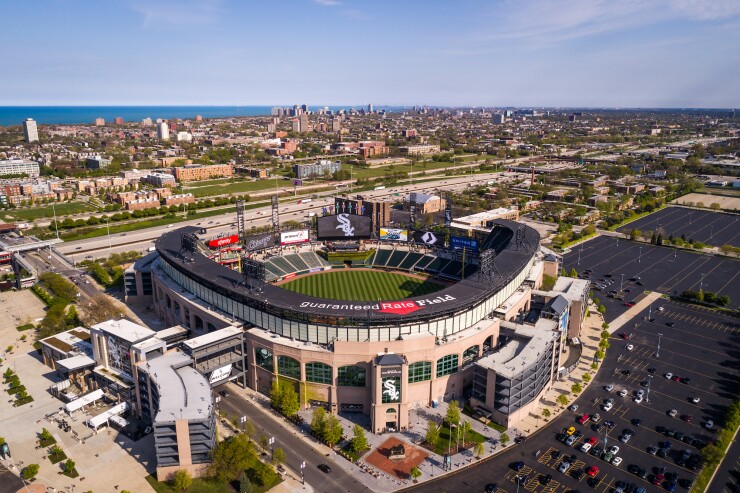The Illinois Sports Facilities Authority returns to the market after a five-year absence with a $129 million refunding buoyed by a ratings return to investment grade territory.
The current refunding for savings of a portion of its 2001 bonds is selling Thursday.

Ahead of the sale, S&P Global Ratings raised the authority’s rating two notches to BBB from BB-plus and assigned a stable outlook. S&P also affirmed the state's general obligation rating of BBB-minus with a stable outlook. Fitch Ratings affirmed its BBB-minus rating on the authority but revised its outlook to stable from negative.
The authority owns and issued debt for the construction of the stadium for Major League Baseball’s White Sox, now known as Guaranteed Rate Field, and issued bonds in 2001 to fund the overhaul of the Chicago Park District-owned Soldier Field, home of the National Football League’s Chicago Bears.
Refunding savings help ease the challenges of managing an escalating debt service schedule with an economically sensitive revenue stream that comes from potentially volatile hotel tax revenue.
Collections have recovered from a dive during the last recession that led the authority in 2011 to tap a Chicago backstop to cover a $185,000 tax gap on its Soldier Field renovation bonds. That’s a concern more for political leaders in Chicago than bondholders as ultimately a state-supported pledge secures the bonds.
RBC Capital Markets is the senior manager with Goldman Sachs as a co-senior manager. Cabrera Capital Markets, Ramirez & Co., Siebert Cisneros Shank and Stifel Nicolaus & Co. Inc. are co-managers. The bonds are being sold in serial maturities between 2028 and 2030 and offer a rare-double tax-exemption from both state income and federal taxes. Most Illinois-based bonds don’t offer the state exemption.
PFM Financial Advisors LLC is advising the authority. Katten Muchin Rosenman LLP and Chico & Nunes PC are co-bond counsel and Charity & Associates PC is disclosure counsel.
The authority’s 2014 ratings of A and BBB-plus from S&P and Fitch tumbled in tandem with the state’s rating deterioration.
“The upgrade reflects the state's recent legislative history of making timely appropriations even in the absence of an enacted budget, mitigating the risk, in our view, of a disruption in the timely payment of ISFA's debt service," said S&P analyst Carol Spain.
"Key credit considerations include a large and diverse statewide economic generating pledged hotel taxes and our view that the tax revenue securing the bonds has demonstrated moderate volatility, with some historical declines but that grew in the past nine years," Spain said.
The pledged revenues provide strong annual debt service coverage but “our view that the general creditworthiness of Illinois partially offsets the credit strengths given the close linkages to the state,” S&P added.
The complex flow of funds and backing begins with a “state tax payment” subject to appropriation. The payment comes from a statutory advance on local hotel taxes that the state draws from its hotel tax, a direct $5 million state subsidy as well as a $5 million city subsidy that comes from its share of state income taxes.
The city’s share of income taxes totaled $242 million in 2018. The authority levies its own 2% hotel tax in the city but it’s not pledged to bondholders. Receipts go to reimburse the state for the advance but they can be used to cover debt service if state funds are not available.
The state tax payment goes right to the trustee, subject to appropriation, but there’s strong incentive for the state to make the appropriation because the funds become “trapped and the state cannot divert or use those funds for any other purpose,” ISFA chief financial officer Dana Phillips Goodum told investors in a recorded presentation.
The authority has no new money borrowing plans, Goodum said.
Fitch’s revision followed its recent revision of the outlook on the state’s BBB GO rating to stable from negative.
“ISFA's ability to make full and timely payment of debt service is contingent on legislative appropriation of revenue to the indenture trustee,” Fitch said. “This appropriation requirement caps the rating at one notch below the state's issuer default rating, which is below the level that the dedicated revenue streams (primarily the state hotel tax) would support.”
The rating is also sensitive to the hotel tax performance. “The state appropriation requirement currently caps the rating below what an analysis of the dedicated revenue stream alone would support” but “unanticipated and sustained weakening of hotel tax collections could lower Fitch's assessment of the revenue stream's growth prospects or resilience of the security and trigger a downgrade,” Fitch said.
The authority maintains hotel tax reserve account of $27.5 million to help offset the volatility of tax collections. Debt service of $45.7 million in fiscal 2020 rises to $87 million in 2032.
Members of the agency's board are appointed by the governor and mayor.





